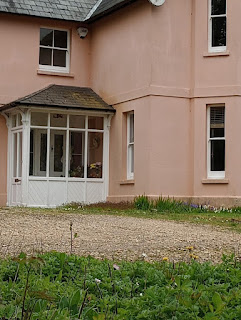
This picture shows a house in Sturminster Newton, Dorset, where Thomas Hardy lived with his first wife Emma for two year from 1875. They had been married just five years and were still very happy. He wrote a poem about it called "The Two-Year Idyll". His diary extracts from this period suggest that the maid they had at the time might have inspired his famous novel "Tess of the Durbervilles". The maid was seduced, left their employ by climbing out of a window at night (the same window through which her seducer entered), had a baby which died, and then disappeared.
I've visited Thomas Hardy's birthplace at least three times, and the house where he died likewise. They are both now owned and managed by the National Trust, and are filled with tasteful period artefacts (none of them original to Thomas Hardy). This is the first time I have managed to track down Sturminster Newton and it has been on my "list" for about 10 years.
As a first wife myself, once much appreciated, but in old age resented and ignored, I had enormous sympathy for poor Emma. Once adored, then neglected and despised, her story struck me as tragic but probably fairly typical. As Mrs Charles Dickens wrote in a letter " I was loved once." Mrs Dickens, just a few years ahead of Emma in age and experience, was cast aside for a mistress, made to leave the family home, and forcibly separated from her children.
Emma and Thomas had no children. A diary entry from the Sturminster Newton interlude suggests that this was a source of sorrow to Thomas ... "Not a sign of one for us".
A recently published book called "The Chosen", was shortlisted for the Walter Scott Prize for Historical Fiction 2023. https://www.walterscottprize.co.uk/seven-strong-shortlist-announced-for-2023-walter-scott-prize/
This novel imagines the relationship between Thomas and Emma and how it deteriorated in the final years (Hardy's mistress Florence Dugdale was actually invited to the house and spent a Christmas with them). I thought it was very well written, and well imagined except for one thing - Emma blames Thomas for the fact they never had children whereas his actual diary entry suggests otherwise.
It's well worth a read as an insight into their marriage. I recommend it if you don't have time to read his diary, her "Recollections", their letters, and his awe-inspiring poetry. After Emma's death he realised what he was missing and poured out a torrent of poetry re-creating their romantic meeting in Cornwall, their four-year courtship. Significantly, perhaps, he wrote nothing about their wedding, and not a word about their honeymoon.
I finally tracked down the house, and the porch where Emma used to wait for him in a white muslin dress at the end of a long, lonely day with no friends and virtually nothing to do. He immortalised this vision in a poem.
"..The dusky house that stood apart,
And her white-muslined,waiting there
In the porch with high-expectant heart..."
The porch above is unlikely to be the original, as porches especially wooden ones have a short life. However, the position is the original one, and it is amazing that there are no new houses built up around this pair of semi-detached villas. Emma,dressed in white muslin, as she was not expected to do housework, was very lonely, waiting for her husband's return, and he knew this, as his poem shows.
Guilty, but not enough to stop him doing so, he admitted that he dawdled on the way home, knowing that she was lonely and eager to see him. He spent time looking at the river, and lingered on his walk over these meadows, which are virtually unchanged in 150 years.
We walked across this meadow, as he would have done.
I had thought that I would be overcome with emotion at finding myself at last treading in the footsteps of Thomas and Emma, and re-creating the feelings he wrote about. He was actually quite good at imagining how Emma must have felt, after she was dead and it was too late.
This did not happen, however. I was pleased to have ticked the visit off my list, took the above three photos, and then went off to find a pub for lunch. I realised that something has changed.
For those who wonder if I'm still here - having posted nothing for nearly a year.
Yes, I'm still here. About to celebrate my 70th birthday this month.
The pandemic changed a lot of things in my life - some things have never recovered - my relationship with books has changed. After the compulsive reading and listening to audio books which spread over the two years 2020 to 2022, it no longer seems so vital to engage with other people's versions of the world. My own, rapidly running towards its conclusion, seems far more important.
I no longer volunteer, since the pandemic closed all the outlets in which I did so - the museum, the local historic monument (English Heritage), plus a nearby National Trust venue. I have not returned to volunteering, being that much older, being less mobile and active since two falls - one in 2021, one in 2022.
My mother-in-law died (unrelated to Covid). The last member of the older generation, and leaving a big gap in many people's lives. The world seems a little emptier, and it has definitely affected husband's outlook on life, not for the better.
I'm still reconfiguring, and trying to come to terms with the finite nature of existence, which didn't seem so finite whilst mother-in-law was still going strong at 97.
I still keep a record of every book I read, and every audio-book I listen to, but it doesn't seem to be so important to share. Planting trees seems much more important.
Best wishes to those who have enquired, why not let me know how your views on life have changed, or not changed, since the events of the last few years.




